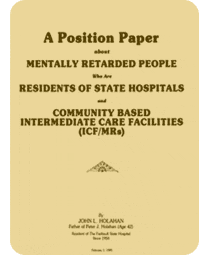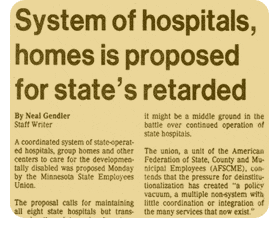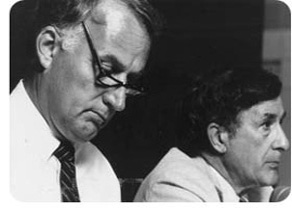AFSCME called for state-operated services.
John Holahan, a concerned parent and a founder of the Arc, submitted a paper asking how it was possible to close the state hospitals and limit the number of beds when there was a waiting list for community services.
The position paper also stated that community programs have high turnover, poor training, no backup, poor support and high burnout.

Holahan's paper was critical of any closures until adequate community services were available.
Meanwhile, the Citizens League studied five different groups, including people with developmental disabilities. It found that Minnesota had overbuilt, had under-relied on out-of-home placements, and had not fully developed family support and apartment living options.
Ultimately, this study pointed out that there was mounting evidence to support use of community services.
In March 1984, Minnesota had 337 community intermediate care facilities serving 5,180 people.

A Citizens League study showed that Minnesota relied too heavily on institutional care and had not fully developed other care options.
Video: Len Levine served as Commissioner of the Department of Human Services and worked on the transition to state operated community services.
Part 1: Transitioning into the Community
Part 2: The Team of Governor Rudy Perpich and DHS Commissioner Len Levine
Part 4: DHS Commissioner Len Levine Recalls Changes in the 1980s
In response to pressure from AFSCME, the Department of Human Services issued a proposal to pilot state-operated support services in 1985. The pilot would tailor and deliver support services based on an individual's needs.
Video: Pete Benner Executive Director, American Federation of State, County and Municipal Employees (AFSCME), Council 6

A new proposal would provide care in state operated community residences and day programs.
In 1986, U.S. Senator Dave Durenberger, chair of a Senate Sub-Committee on finance, held public hearings to discuss Senator John Chafee's bill to fund community and family living options. Durenberger noted that while the Chafee bill was complicated and emotionally charged, the 20 titles of the Social Security Act didn't match the realities of 1986.
It was time to turn Social Security on its head, he said.

Senator Durenberger vowed to turn Social Security on its head.
In 1986, the Minnesota Governor's Council on Developmental Disabilities (Council) published "A New Way of Thinking."
This publication described the move from institution to community and the necessary paradigm shift. According to the Council, the general public needed to view people with developmental disabilities as capable of learning, living, working, and enjoying life in regular environments, with appropriate supports.
It was time to begin looking at people's strengths, not test scores.


Video: Detroit Lakes News Story (1987)
A 1987 early supported employment pilot project, "Project Compete," offered a practical approach to teaching job skills for individuals with developmental disabilities. Training was done onsite at the employer's place of business with supported employment services that could fade over time, and provided by Clay and Becker County Developmental Achievement Centers.








